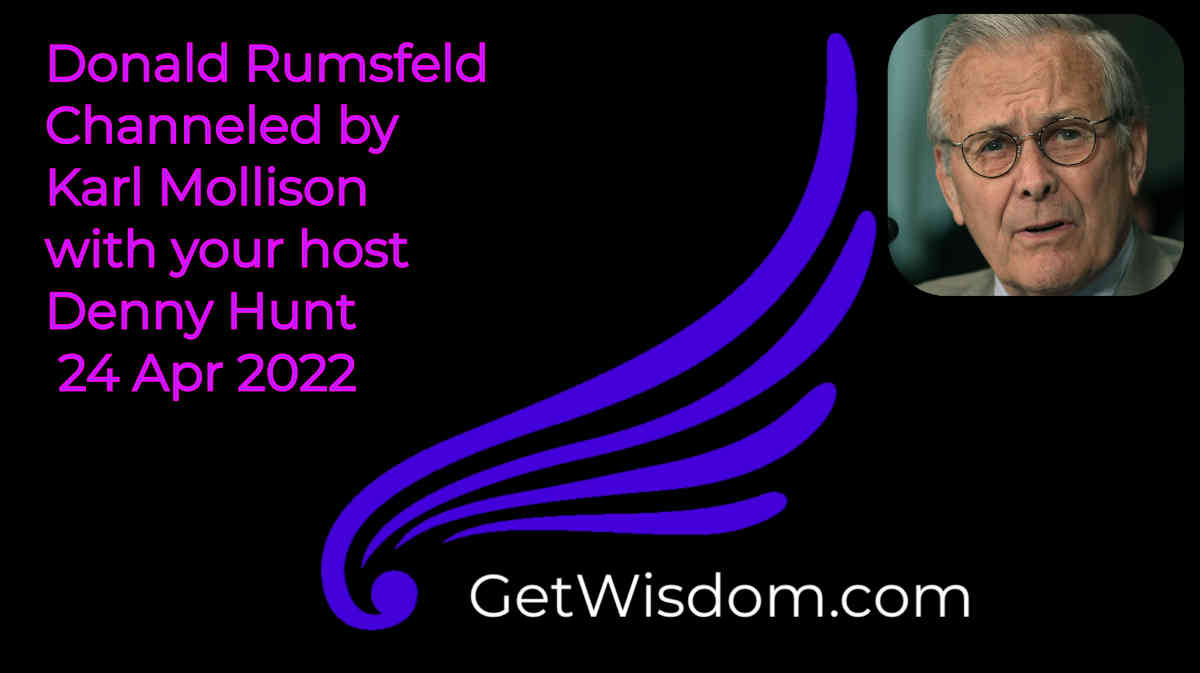
Donald Rumsfeld Channeled by Karl Mollison 24Apr2022
From https://en.wikipedia.org/wiki/Donald_Rumsfeld’
Donald Henry Rumsfeld July 9, 1932 – June 29, 2021 was an American politician, government official and businessman who served as Secretary of Defense from 1975 to 1977 under president Gerald Ford, and again from 2001 to 2006 under President George W. Bush.
He was both the youngest and the oldest secretary of defense. Additionally, Rumsfeld was a three-term U.S. Congressman from Illinois (1963–1969), director of the Office of Economic Opportunity (1969–1970), Counselor to the President (1969–1973), the U.S. Representative to NATO (1973–1974), and the White House Chief of Staff (1974–1975). Between his terms as secretary of defense, he served as the CEO and chairman of several companies.
Born in Illinois, Rumsfeld attended Princeton University, graduating in 1954 with a degree in political science. After serving in the Navy for three years, he mounted a campaign for Congress in Illinois’s 13th Congressional District, winning in 1962 at the age of 30. While in Congress, he was a leading co-sponsor of the Freedom of Information Act. Rumsfeld accepted an appointment by President Richard Nixon to head the Office of Economic Opportunity in 1969; appointed counsellor by Nixon and entitled to Cabinet-level status, he also headed up the Economic Stabilization Program before being appointed ambassador to NATO. Called back to Washington in August 1974, Rumsfeld was appointed chief of staff by President Ford.
Rumsfeld recruited a young one-time staffer of his, Dick Cheney, to succeed him when Ford nominated him to be Secretary of Defense in 1975. When Ford lost the 1976 election, Rumsfeld returned to private business and financial life, and was named president and CEO of the pharmaceutical corporation G. D. Searle & Company. He was later named CEO of General Instrument from 1990 to 1993 and chairman of Gilead Sciences from 1997 to 2001.
Rumsfeld was appointed Secretary of Defense for a second time in January 2001 by President George W. Bush. As Secretary of Defense, Rumsfeld played a central role in the invasion of Afghanistan and invasion of Iraq. Before and during the Iraq War, he claimed that Iraq had an active weapons of mass destruction program; yet no stockpiles were ever found. A Pentagon Inspector General report found that Rumsfeld’s top policy aide “developed, produced, and then disseminated alternative intelligence assessments on the Iraq and al-Qaeda relationship, which included some conclusions that were inconsistent with the consensus of the Intelligence Community, to senior decision-makers “Eight U.S. and other NATO-member retired generals and admirals called for Rumsfeld to resign in early 2006 in what was called the “Generals Revolt”, accusing him of “abysmal” military planning and lack of strategic competence.
Commentator Pat Buchanan reported at the time that Washington Post columnist David Ignatius, who traveled often to Iraq and supported the war, said the generals “mirror the views of 75 percent of the officers in the field, and probably more”. Rumsfeld rebuffed these criticisms, stating, “out of thousands and thousands of admirals and generals, if every time two or three people disagreed we changed the secretary of defense of the United States, it would be like a merry-go-round.”
Bush defended Rumsfeld throughout and responded by stating that Rumsfeld is “exactly what is needed”.
Rumsfeld shakes President Bush’s hand as he announces his resignation, November 8, 2006.
On November 1, 2006, Bush stated he would stand by Rumsfeld as defense secretary for the length of his term as president. Rumsfeld wrote a resignation letter dated November 6, 2006, and, per the stamp on the letter, Bush saw it on Election Day, November 7, 2006. Rumsfeld’s tenure was controversial for its use of torture and the Abu Ghraib torture and prisoner abuse scandal.
In his retirement years, he published an autobiography, Known and Unknown, as well as Rumsfeld’s Rules: Leadership Lessons in Business, Politics, War, and Life.
He died on June 29, 2021, at the age of 88.


